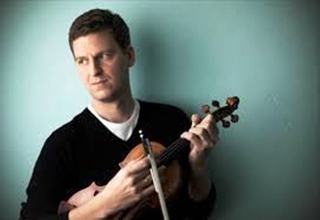|
Back
Sizzling Sibelius, Proper Mahler New York
David Geffen Hall, Lincoln Center
04/15/2019 -
Ludwig van Beethoven: Overture to Egmont, Op. 84
Jean Sibelius: Violin Concerto in D Minor, Op. 47
Gustav Mahler: Symphony No. 1
James Ehnes (Violinist)
London Philharmonic Orchestra, Edward Gardner (Conductor)

J. Ehnes (© Benjamin Ealovega )
“Whereas most other modern composers are engaged in manufacturing cocktails of every hue and description, I offer the public cold spring water.”
Jean Sibelius (1865-1957)
As shown Sunday afternoon, last night’s London Philharmonic Orchestra (LPO) concert showed a sterling orchestra (duh), excellent first chair players (though the horns were hardly faultless), and a conductor in Edward Gardner, who is competent, frequently inspired and sometimes even exciting.
Yet as Jean-Efflam Bavouzet showed on Sunday, the concerto soloist gave the most memorable moments.
James Ehnes played the oft-performed Sibelius Violin Concerto with more than deft fingers on his fiddle. From the first haunting notes, one realized that this had to be a Stradivarius. No other tones sound as rapturous, no other sounds could have that cool but sensuous sounds which Sibelius needed.
Yet this gives too much credit to a piece of wood! Mr. Ehnes played this first movement with ferocity and adoration, each mood vying with each other until the cadenza. I have heard Anne-Sophie Mutter play this cadenza with deep ardor. But until Mr. Ehnes, I have never heard such clarity from the violin, such a transparent exhibition of Sibelius’ skill in this, his first instrument.
The second movement was played with a straightforward, never too deep line. Yet it was the finale where Mr. Ehnes struck a chord of actual playfulness, galloping over the lines with confidence, with joy, and with triumph.
Mr. Gardner’s LPO was accompanied well, and the trumpets blared out when necessary. But this was James Ehnes’ show, and he obviously could have played all night. Both encores were from two Third Sonatas. The Bach Largo was beautiful, and the Eugčne Ysa˙e “Ballade” showed his cool brilliant technique.
(It also, unfortunately, was the only relatively unknown name on the two programs. Mr. Gardner’s choice of composers was oh so blah, oh, so ordinary, no matter the nature of the performance. Nothing even vaguely challenging or daring for New York audience.)
The conductor did show his might in the opening Egmont Overture. A string section much larger than Beethoven could have imagined brought a standup force to this most forceful piece.
Those were the highlights. The Mahler First Symphony is fungible enough for many renderings. Mr. Gardner was so nice (not mannered but nice), and so proper.
Not, though, that necessary other-worldly start. Perhaps I have heard too many great conductors bringing those calls, those whispers, those unnamed birds out of nothingness except string stirrings One prefers not to see the conductor, to allow those calls to be inevitable, not channeled by a person.
Mr. Gardner never allowed that to happen. The start was simply a succession of sounds, played and conducted as if an introduction to a Haydn symphony. He continued the movement well enough, but the secret is to transform episodes into cohesion. Mr. Gardner conducted episodes.
The scherzo lines were repeated...and repeated, without much change. Only in the Trio did he bring his LPO to something approaching atmosphere. Then came the so-called Funeral Parody movement, which Mahler had originally pictured (Peace, Pet Sematary’s Stephen King) a group of animals leading another animal to the graveyard.
Mahler also specified that the movement be played by “miserable village musicians.” The structure, too, with its fake fugues, is like Mozart’s Village Musicians quintet. Well, Mr. Gardner started perfectly nicely with First Double Bass Kevin Rundell painfully literally scratching out with the “Brother Martin” theme. (Mahler wanted a “sepulchral whine”, but never mind.) After that, the LPO played all too nicely, all too beautifully, the clarinet solo not Klezmer but simply shrill.
I don’t want to call this performance, inspired by a Chagall painting, “Gentile”, but it was hardly ethnic. Mahler’s Jewishness was always a question in his symphonies, yet for this movement, one could easily pull out all the Chassidic “If I were a rich man” emotions.
Mr. Gardner did a creditable job with the finale, he let it roll on after that clash at the opening, and his brass were at their brassiest. When they all stood up for the last measures, it was not Mahler’s direction. He did ask for that in his first edition, but later felt it was too showy.
No matter. Mr. Gardner’s Sousa-style conducting was perfectly appropriate, bringing a now-mesmerized audience to its own adulating feet.
Harry Rolnick
|